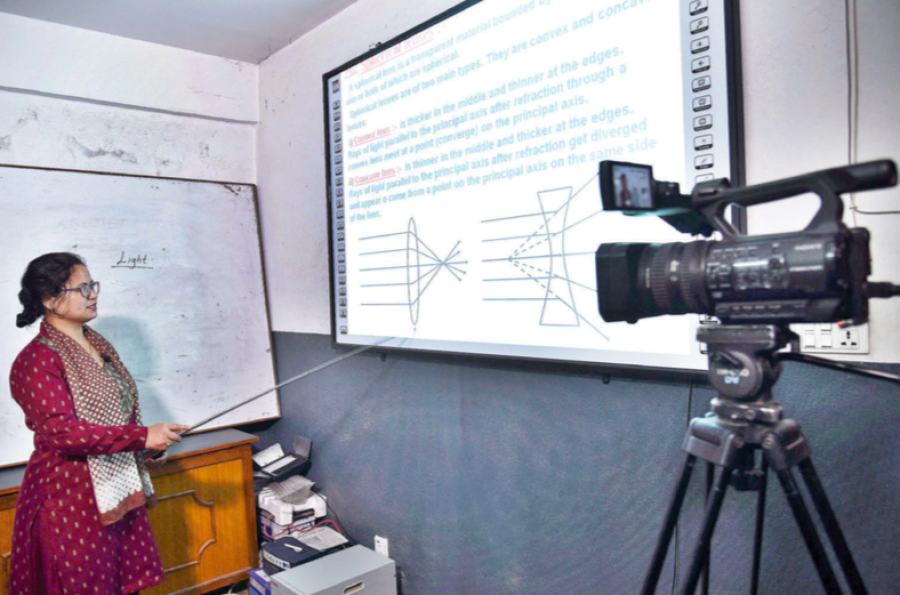National
Digital divide too wide for online classes to succeed in Nepal
The government has proposed online teaching-learning, but a majority of the schools and students in the country do not have computers, much less the internet.
Binod Ghimire
A feasibility survey on online teaching-learning conducted by a Indrawati Rural Municipality in Sindhupalchok has found that the area does not have the kind of internet access and coverage to start remote classes.
Following the decision of the Ministry of Education to start online classes, Indrawati Rural Municipality had recently conducted the random survey among school children and parents. The study found that less than 10 percent of the students had internet access at their homes.
Dozens of households do not even have televisions at their homes and the radio is their only source of news and information, the survey found.
“How can we think of online classes where people don’t even have televisions?” Bansa Lal Tamang, chairperson of the rural municipality, told the Post.
According to Tamang, who is also the general-secretary of National Association of Rural Municipalities in Nepal, a majority of the local units in Sindhupalchok are not in the position to start online classes.
The country is already two months into the coronavirus lockdown, and there is no sign of academic institutions resuming anytime soon.
The KP Sharma Oli government has proposed online classes as a teaching-learning alternative for schools and colleges. But seems easier said than done, with a large number of students who do not have internet access at their homes.
The government’s policies and programmes, endorsed last week by the federal parliament, announced promoting online and technology based education, contradicting its own report that says a majority of schools in the country do not even have computers, let alone internet access. According to the Economic Survey, presented in Parliament on Tuesday, among the 29,707 public schools, only 8,366 have computers while the number of the schools that offer Information Technology-based study with the internet connectivity stands at 3,676, which is just 12 percent.
The new academic session normally starts in mid-April. However, all schools and colleges have been closed since March 18. The country went into a full lockdown stage on March 24.
A committee led by Lekh Nath Sharma, vice-chancellor at the Open University, has also recommended that the government promote online education, so that students do not miss their classes. The committee’s suggestion could be viable for only a few schools and colleges, mostly in the city areas.
Although the government had announced a budget to equip additional 1,000 schools with broadband internet and IT laboratories, the programme has seen little progress.
Education experts say the government's idea of online study is overhyped. They reckon providing online courses is not possible even at the university level, much less schools.
There are over 7.5 million students from the school to university levels.
A recent report of Nepal Telecommunications Authority shows that about 72 percent of the people are connected to the internet, and an overwhelming number of them rely on mobile data to access the internet. Only around 12 percent of the people have broadband internet connection.
Binay Kusiyait, a professor at the Tribhuvan University, says though it has been over a month since he started teaching online, not even one-third of his students attend the virtual class.
“Providing online study sounds fascinating, but it is not a pragmatic idea,” he told the Post.
Kusiyait, who has conducted several researches on school education, says while it is true that online study is the future, Nepal is not ready for it yet.
Pokhara Metropolitan City had last month issued a circular to schools to stop online classes, citing the digital divide was so wide that conducting remote classes went against the spirit of equitable access to education.
Kusiyait says access to the internet and computers alone is not enough to run online classes.
“Teachers, too, should know the way around the technology to deliver effective classes. Besides, we should also consider that students might have problems making the transition to digital learning,” he told the Post.
As countries around the world are adopting online teaching-learning amid the Covid-19 pandemic,there is a growing fear that this approach could widen the digital divide in many Asian countries.
A story by Times Higher Education last month said shifting towards online study could leave behind the students from less-privileged communities.
“It’s (online study) is more than just the computer and network per se. The home environment also matters. This tends to put poorer students at a disadvantage,” Kai-Lung Hui, associate dean (research) at the Hong Kong University of Science and Technology Business School, had told the Times.




 20.12°C Kathmandu
20.12°C Kathmandu














